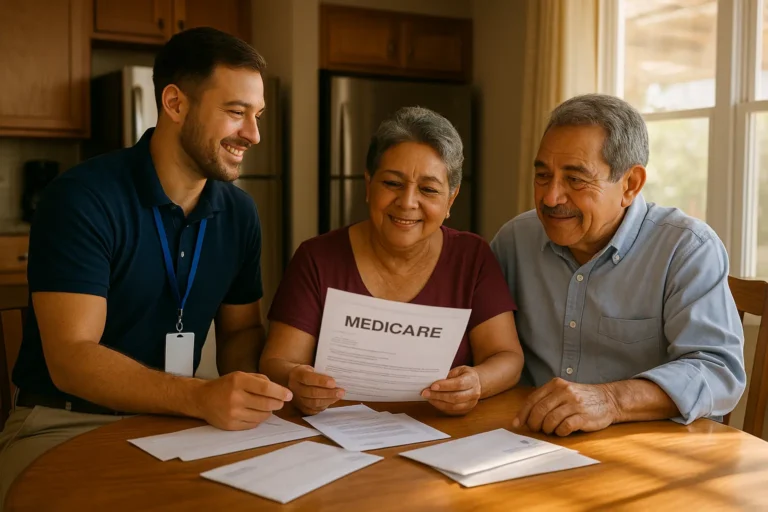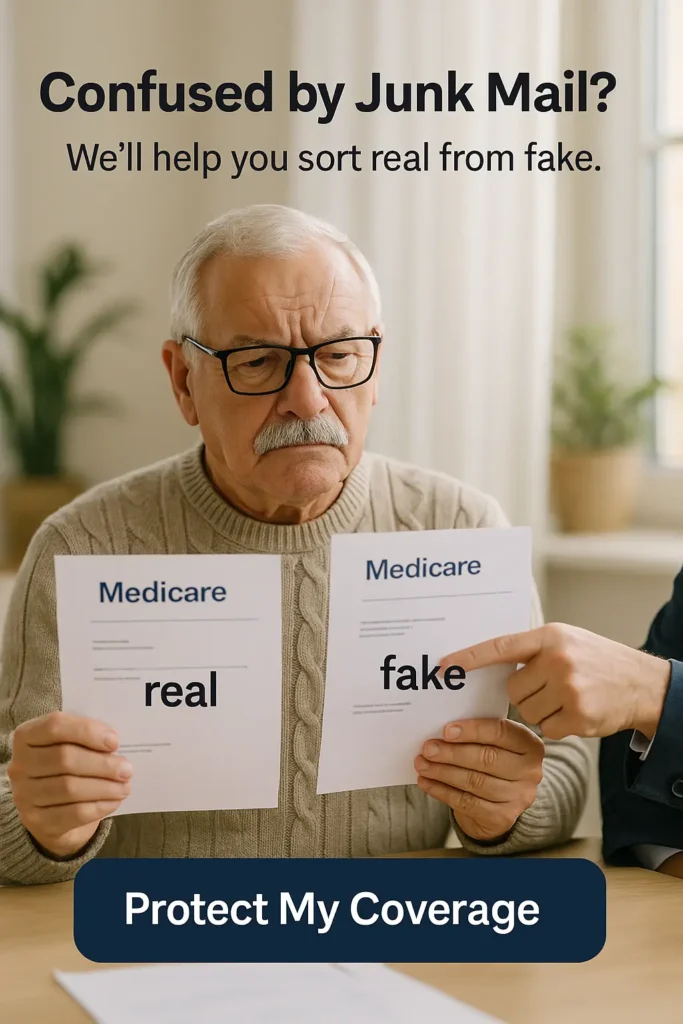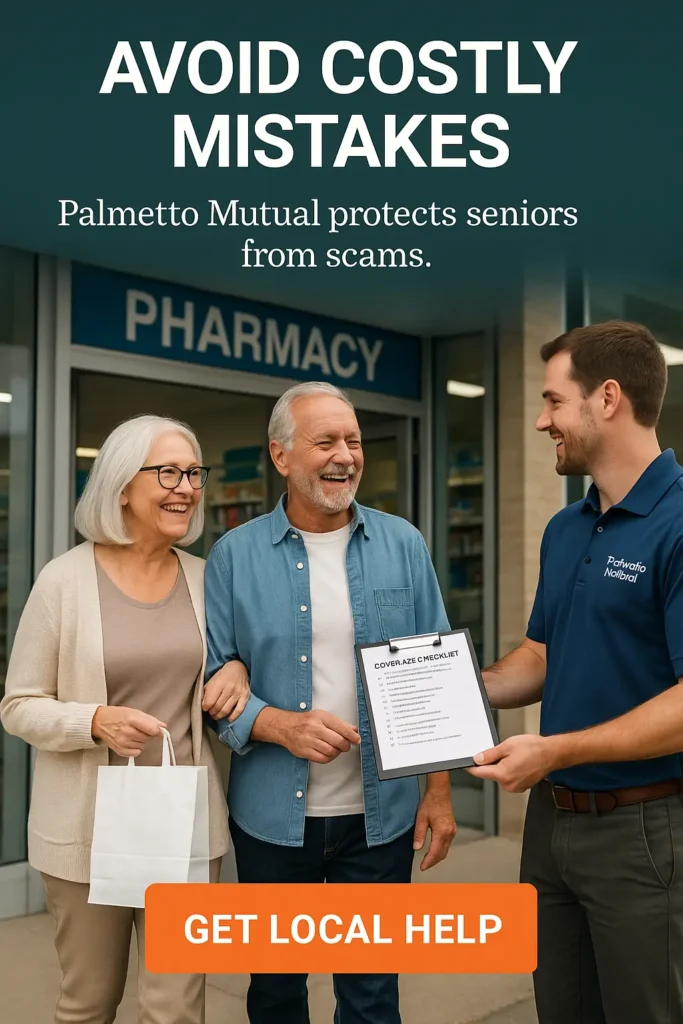Home > Medicare > Medicare Scams & Junk Mail Traps

Medicare Scams, Junk Mail & Call Center Traps — How to Protect Yourself in 2025
Every year, millions of seniors turning 65 are targeted with Medicare scams, junk mail, and relentless call center pitches — and 2025 is no different. From offers that sound “too good to be true” to high-pressure sales tactics, these traps are designed to confuse you into making quick decisions that may not be in your best interest. Palmetto Mutual’s experts are here to help you recognize the red flags, filter out the noise, and protect yourself from costly mistakes while choosing your Medicare coverage.
Why Seniors Are Targeted with Medicare Scams and Junk Mail
Like pulling back a 🎭 curtain on a stage play, understanding why scammers and marketers target seniors with Medicare offers reveals the whole production. From how your information becomes public to why your mailbox overflows each fall, here’s what’s happening behind the scenes.
📊 The Numbers Behind Medicare Marketing Madness
⚠️ Disclaimer: The following story is a fictional example based on real-life Medicare situations commonly experienced by seniors across the United States. It’s designed to help readers better understand their coverage options, explore ways to reduce costs, and avoid common pitfalls — whether you’ve had Medicare for one year or twenty.
💬 Kathy’s Story:
“A caller told me they were from ‘Medicare Services’ and tricked me into giving personal information. It sounded so official I believed them. Now I know Medicare doesn’t call you out of the blue. Sharing what I learned helps protect my neighbors too.” — Kathy, Retired Electrician
📍 The moment you turn 64 or 65, your name and address can appear in public record lists that insurers and marketers buy legally. That’s why folks in places like Myrtle Beach (ZIP 29572, 29577, 29588) or Florence (ZIP 29501, 29505) often see waves of postcards and letters weeks before their birthday month.
Insurance companies spend millions because Medicare Advantage and Medigap plans are profitable. Each new enrollment can bring thousands of dollars in commissions or subsidies, so you’re seen as a valuable target.
🎯 Why You’re Getting More Mail Than Ever
In 2025, the government (CMS) relaxed certain marketing rules, which means insurers can now reach out more often.
📬 For example:
- A retired teacher in Columbia, SC (29209) might see 15–20 Medicare mailers per week during the Annual Enrollment Period (AEP).
- A widow in Charleston (29412) could easily get double that number, with multiple flyers in a single day.
This isn’t a personal attack on you — it’s an industry-wide flood, and every senior in your neighborhood is getting hit with the same wave.
💡 The Psychology Behind High-Pressure Tactics
Scammers know that Medicare decisions can feel as overwhelming as trying to read a new prescription bottle without your glasses 👓.
They use tricks like:
- Fear of missing deadlines (“You’ll lose your coverage if you don’t act now!”)
- Confusion about coverage gaps (“You don’t have drug coverage — let us fix that today!”)
- Worry over medical costs (“You’ll save $300 a month if you switch today!”)
By rushing you, they hope you won’t double-check the details or ask a trusted advisor.
The Most Common Medicare Scams in 2025
Think of Medicare scams like 🥛 expired milk in your fridge — they may look fine sitting on the shelf, but one sip (or one quick signature) can leave you sick to your stomach. Just like you always check expiration dates before pouring a glass, you need to double-check every Medicare call, letter, or offer before trusting it.
🚨 The “Medicare is Calling” Trick
📞 Real Medicare (CMS) will never call you out of the blue. If someone says they’re from “Medicare headquarters” or “Medicare Services” and demands your Medicare number, it’s a scam.
👉 Their favorite line is:
- “Your benefits will be canceled if you don’t act right now.”
That urgency is the rotten smell in the carton — toss it immediately.
📱 Fake Plan Enrollment Schemes
Some scammers pretend to be licensed insurance agents. They may trick you into signing forms or saying “yes” on a recorded call. Without realizing it, you’re enrolled in a plan you didn’t choose.
❌ The danger:
- You could lose access to your doctor at Conway Medical Center (ZIP 29526)
- Your prescription drugs at CVS on Hwy 17 in North Myrtle Beach (29582) might no longer be covered
Scammers get a commission 💰, while you’re left paying higher costs and scrambling for care.
📦 Scam vs. Legit Comparison Table
Here’s a simple checklist you can print and keep by the phone:
| 🚩 Scam Red Flags | ✅ Legitimate Medicare Contact |
|---|---|
| Unsolicited calls claiming to be Medicare | Official mail from Medicare.gov |
| Demands immediate payment or personal info | Gives you time to review and decide |
| Offers “free” medical equipment or services | Clear pricing and coverage details |
| Says your Medicare card is expiring | Medicare cards do not expire |
| Promises benefits not typically covered | Realistic coverage explanations |
| Asks for bank or Social Security numbers | Medicare only asks for your Medicare # when YOU call |
| Claims you’ll lose coverage if you don’t act now | Respects enrollment period rules |
| Uses Gmail/Yahoo email | Uses official .gov addresses |
🎭 The “Update Your Medicare Card” Scam
Another classic trick is the “We need to update your Medicare card” line. Fraudsters say you need to give your Medicare or Social Security number to receive a new card.
🚫 Don’t fall for it: Medicare automatically sends new cards when needed. You never have to request one by phone.
💡 Mid-Article CTA #1
👉 If a plan sounds “too good to be true,” it probably is. Palmetto Mutual’s licensed local experts can help you separate scams from real Medicare options — so you can feel safe and protected.
How to Spot Fake Medicare Calls and Call Center Traps
Like checking off a 📝 to-do list, spotting fake Medicare calls takes step-by-step attention. Each red flag you identify is like ticking another box that keeps you safe from fraud. Scammers use pressure, fear, and confusion to trick seniors into giving up private details — but with a little preparation, you can recognize their tactics before they cause harm.
🎷 Jean’s Story — Learning the Hard Way
⚠️ Disclaimer: The following story is a fictional example based on real-life Medicare situations commonly experienced by seniors across the United States. It’s designed to help readers better understand their coverage options, explore ways to reduce costs, and avoid common pitfalls — whether you’ve had Medicare for one year or twenty.
💬 Jean’s Experience:
Jean, a retired jazz musician from Florence, SC (ZIP 29505), thought she was staying safe by answering every Medicare call. One pushy salesperson convinced her to share her Medicare number, and within weeks she was switched into a plan that dropped her preferred doctors at McLeod Regional Medical Center. After a long process of fixing the mess, she now only works with a single trusted local agent.
“The music sounds sweeter when the phone stops ringing.” — Jean 🎺
✅ Your Defense Checklist Against Phone Scams
Here’s what to watch for — treat this list like boxes you can check off each time the phone rings:
Immediate Warning Signs:
- Caller can’t provide a valid license number
- They already know details you didn’t share
- High-pressure demand to “act within 24 hours”
- Offers that sound way too generous
- Requests for payment with gift cards or wire transfer
📞 Common Call Center Manipulation Tactics
Big call centers sometimes run scams with professional scripts that sound legitimate. They may say things like:
- “Your current plan is ending — you need to switch now.”
- “You’re missing out on new benefits only available this year.”
- “We’re calling from your doctor’s office to help with your Medicare.”
📍 Seniors in Horry County (ZIP 29526, Conway; ZIP 29582, North Myrtle Beach) often report these calls during the Annual Enrollment Period because call centers blanket entire regions at once.
🛡️ How to Verify Legitimate Medicare Calls
If you’re unsure about a call, pause and double-check:
- Hang up and call 1-800-MEDICARE directly
- Ask the caller for their National Producer Number (NPN) and verify it online
- Never give personal or banking info to an incoming caller
- Request all information in writing before making any choices
💡 Remember: Real Medicare agents and local advisors will respect your time and never pressure you.
Junk Mail vs. Official Medicare Notices — How to Tell the Difference
Sorting through Medicare mail can feel like making a 🥪 sandwich — you’ve got to look at each layer to know what you’re really biting into. The top bun (header), the meat (main message), and the bottom bun (footer) all tell you whether what’s in your hands is the real deal or just marketing fluff.
📬 Official Medicare Mail Characteristics
Real Medicare mail comes in plain white or light-blue envelopes with the official Medicare logo. You’ll also notice:
- 📌 Clear return addresses from the Centers for Medicare & Medicaid Services (CMS)
- 📝 Straightforward explanations about your benefits
- 📅 Updates about things like deductibles or premium adjustments
- ⚖️ No sales pressure, deadlines, or flashy colors
👉 Importantly, real notices never include prepaid enrollment envelopes or demand immediate phone calls.
🗑️ Spotting Junk Mail Disguised as Official Notices
Insurance companies often design their mailers to look official. Watch out for these tricks:
- Bold envelopes marked “Important Medicare Information Enclosed”
- Fake “case numbers” or “reference codes” to make it look like a bill
- The phrase “Official Business” on the outside
- Medicare card lookalikes printed on inserts
- Pressure-filled phrases like “Final Notice” or “Immediate Response Required”
📍 For example, seniors in Hilton Head Island (ZIP 29928) report getting weekly flyers that mimic the look of Social Security or Medicare mail — but they’re really just ads.
Common Junk Mail Tactics (H4)
- Copying fonts and colors from government letters
- Adding phony “tracking codes”
- Creating fake deadlines to push quick decisions
- Using Medicare logos in a misleading way
- Promising “exclusive benefits” not found on Medicare.gov
💵 ZIP Code Pricing: The Tourist Penalty
Even when the offer looks real, scammers often skip over fine print. In busy tourist ZIPs like 29928 (Hilton Head Island), premiums for popular plans like Medigap Plan G can run $5–$8 higher per month than in quieter areas like 29936 (Hardeeville).
📌 A legitimate local advisor will explain these geographic cost differences up front. Scammers, on the other hand, avoid mentioning them until after you’ve enrolled.
🔍 What Real Medicare Notices Actually Say
Legitimate Medicare notices are usually about:
- ✅ Annual deductible changes
- ✅ Premium adjustments (including IRMAA for higher incomes)
- ✅ Preventive service reminders (like flu shots or screenings)
- ✅ Medicare Summary Notices (claims you’ve already used)
- ✅ General plan updates for the coming year
📬 If the letter you’re holding is telling you to call today, sign immediately, or switch to a “special government program,” it’s junk — not Medicare.
Red Flags That Signal a Medicare Scam
Spotting a Medicare scam is like looking at the picture on a 🧩 puzzle box lid. Once you see the big picture, every little piece of the scam becomes obvious — the pressure phrases, the false promises, the sneaky requests for personal info. With that full image in mind, you’ll know instantly when something doesn’t fit.
🚩 The Pressure Phrases That Should Make You Hang Up
⚠️ Disclaimer: The following story is a fictional example based on real-life Medicare situations commonly experienced by seniors across the United States. It’s designed to help readers better understand their coverage options, explore ways to reduce costs, and avoid common pitfalls — whether you’ve had Medicare for one year or twenty.
💬 Larry’s Story:
“What if you think you’ve enrolled, but it turns out the junk mail you signed wasn’t real? That happened to me. I thought I had coverage lined up, but I didn’t. Now I only deal with official sources — never random mailers.” — Larry, Retired Electrician
Here are common pressure phrases scammers use to push seniors:
- “This offer expires at midnight.” ⏰
- “Your neighbor already signed up.” 🏘️
- “You’ll lose your doctor if you don’t switch now.” ⚠️
- “This is a special government program.” 🇺🇸
- “I can only give you this price today.” 💸
👉 Anytime you hear urgency instead of education, treat it like a scam.
💰 Too-Good-To-Be-True Benefits
Scammers often dangle benefits that don’t actually exist under Medicare:
- ❌ Cash rebates just for switching
- ❌ Free medical equipment without a doctor’s order
- ❌ Unlimited dental & vision coverage
- ❌ Coverage for cosmetic surgeries
- ❌ Prescription drugs with “no restrictions at all”
If it sounds like winning the lottery, it’s a scam.
🎯 Personal Information Fishing Attempts
Legitimate Medicare sources never ask for your most sensitive info over the phone. Red flags include requests for:
- Full Social Security number (only last 4 digits are ever used)
- Bank account or credit card info 💳
- Passwords for online accounts 🔑
- Detailed personal health info before enrollment
- Any payment before services are given
Scammers use these details to commit identity theft — not to help you.
💡 Mid-Article CTA #2
📬 Junk mail piles up fast, and scam calls never seem to end. Palmetto Mutual’s local experts will show you which letters matter and which to toss — so you can stop worrying and focus on the coverage you really need.
What to Do If You Accidentally Share Personal Information
If you slip up and give personal details to a scammer, your recovery path works a bit like an 🔮 insurance horoscope. The “prediction” depends on exactly what you shared — and each scenario calls for a different set of protective steps.
🧾 If You Shared Your Medicare Number
Your immediate future requires vigilance. 🌙
- Monitor your Medicare Summary Notices closely for any claims you didn’t receive.
- Report suspicious activity right away to 1-800-MEDICARE.
🏦 If You Gave Out Bank Information
Quick action is written in your stars. 🌟
- Call your bank immediately to freeze your account.
- Dispute any unauthorized charges.
- Set up fraud alerts with your bank’s fraud department.
🆔 If You Provided Your Social Security Number
A full security overhaul is ahead. 🌌
- Place a fraud alert with all three credit bureaus (Equifax, Experian, TransUnion).
- Consider enrolling in an identity theft protection service.
- Keep copies of all communications in case law enforcement is needed.
🚨 Immediate Steps to Take
Within the first 24 hours, here’s what you should do:
- Call your bank to freeze affected accounts 🏦
- Report the incident to Medicare (1-800-MEDICARE) ☎️
- Change your passwords for email and financial accounts 🔑
- Document every detail about the scam interaction 📓
✅ Fraud Red Flags Checklist
Here’s a simple checklist to help you recognize and report scams quickly:
| ⚠️ Warning Sign | ✔️ Yes/No | 📌 What It Means |
|---|---|---|
| Caller asked about unused gym benefits | ☐ Yes ☐ No | Scammers fishing for plan details |
| Wanted to “verify” transportation benefits | ☐ Yes ☐ No | Classic identity theft tactic |
| Mentioned denied coverage from past claims | ☐ Yes ☐ No | Exploiting frustration to gain trust |
| Talked about preauthorization problems | ☐ Yes ☐ No | Using fear to create urgency |
| Offered to “fix” your coverage gaps | ☐ Yes ☐ No | Setting up unauthorized switches |
| Asked for Medicare number to “check benefits” | ☐ Yes ☐ No | Direct identity theft attempt |
| Claimed to be from your doctor’s office | ☐ Yes ☐ No | Impersonation scam |
| Promised benefits not on your current plan | ☐ Yes ☐ No | Bait-and-switch ploy |
📞 Who to Contact for Help
If you’ve shared info, here are the trusted resources to call:
- Medicare Fraud Hotline: 1-800-MEDICARE (1-800-633-4227)
- Federal Trade Commission: ReportFraud.ftc.gov
- Senior Medicare Patrol (SMP): 877-808-2468
- Your State Insurance Commissioner: Offers local support and complaint filing
🛡️ Protecting Yourself Going Forward
After any scare, build up your defenses:
Never answer calls from numbers you don’t recognize 🚫
Sign up for the Do Not Call Registry ☎️
Turn on account alerts at Medicare.gov 🔔
Review your Medicare Summary Notices monthly 📑
Shred all personal documents 🗑️
How to Stop Unwanted Medicare Sales Calls and Mailers
Like stacking 🧱 sandbags against a rising flood, you can protect yourself from the endless stream of Medicare phone calls and junk mail. By knowing your rights and using the tools available, you can keep the worst of it out — and finally enjoy some peace and quiet.
🃏 Joann’s Story — From Overwhelmed to Confident
⚠️ Disclaimer: The following story is a fictional example based on real-life Medicare situations commonly experienced by seniors across the United States. It’s designed to help readers better understand their coverage options, explore ways to reduce costs, and avoid common pitfalls — whether you’ve had Medicare for one year or twenty.
💬 Joann’s Experience:
Joann, who runs a weekly bridge club in North Myrtle Beach (ZIP 29582), thought she was being smart by reading every Medicare flyer that came to her mailbox. But the more she read, the more confused she became — and she almost missed her enrollment deadline. After meeting with a local licensed advisor, she said:
“Now I can focus on bridge instead of brochures.”
🛑 Your Legal Rights Under CMS Marketing Rules
Think of CMS protections like sandbags along a riverbank — they don’t stop the rain, but they give you control. You have the right to:
- Request removal from mailing lists ✉️
- File complaints about aggressive marketing 📝
- Report agents who won’t respect your wishes 🚫
- Demand written information only 📄
- Refuse door-to-door solicitations 🚪
📵 Stopping Robocalls and Telemarketing
Register with Do-Not-Call Lists (H4)
- National Do Not Call Registry: DoNotCall.gov
- Takes about 31 days to become fully active
- Reduces legitimate telemarketing by up to 80%
- Note: It won’t stop scam calls, but it gives you legal recourse
Use Call-Blocking Technology (H4)
- Carrier tools like AT&T Call Protect or Verizon Call Filter
- Third-party apps like Nomorobo or TrueCaller
- Built-in smartphone spam filters 📱
- Standalone call-blocking devices for landlines ☎️
📬 Reducing Junk Mail Volume
Here’s how to lighten your mailbox:
- DMAchoice.org: Opt out of prescreened offers
- OptOutPrescreen.com: Stop credit and insurance offers
- Call insurance companies directly to remove your name
- Mark mail as “Return to Sender — Refused” and drop it back in the mailbox
📍 Seniors in Florence (ZIP 29501) report cutting their junk mail by half within three months of registering with DMAchoice.

Reporting Scams to Medicare and Government Agencies
Explaining scam reporting to a loved one is like talking to your mom about the 🚶 neighborhood watch. You’re not bothering anyone — you’re protecting the whole community. Reporting Medicare scams is the same: it helps stop the crooks and keeps your neighbors safe.
📋 How to File an Effective Fraud Report
When you call Medicare or another agency, details matter. Write down:
- 📅 Date and time of the contact
- 📞 Phone number that called you
- 🏢 Company name or caller’s name (if provided)
- 🗣️ Exact promises, threats, or phrases used
- 📄 Any mail, emails, or documents you received
- 🔒 What personal information (if any) you shared
💡 Tip: Keep a small notebook by the phone so you can jot this info down immediately.
🏛️ Government Agencies That Investigate Medicare Fraud
Office of Inspector General (OIG) (H4)
- Handles large-scale Medicare fraud cases
- Report online at OIG.HHS.gov
- Works with law enforcement to prosecute criminals
- Tracks patterns across states and regions
State Insurance Commissioners (H4)
- Regulate insurance agents in your state
- Can revoke licenses of bad actors
- Provide senior-specific fraud hotlines
- Offer local enforcement if the scammer is nearby
📍 Example: South Carolina’s Department of Insurance in Columbia regularly investigates complaints from Horry (29526) and Beaufort County (29910, 29926) seniors who’ve been tricked into fake Medicare enrollments.
💵 Coastal ZIP Pricing Bump
Living in coastal areas often comes with higher premiums. For example, in Bluffton (ZIP 29910) or Hilton Head Island (ZIP 29926), Medigap Plan G can cost $5–$7 more per month than inland ZIPs.
👉 Scammers rarely mention these location-based differences. A legitimate advisor will always explain ZIP-based pricing before enrollment.
🎯 When to Contact Law Enforcement
Go beyond Medicare hotlines and call police or FBI if:
- You lost money to scammers 💰
- Someone impersonates a federal employee 🕵️
- You’re receiving repeated threats or harassment 🚫
- Identity theft has already happened 🆔
- Your bank or credit cards are compromised 💳
💡 Mid-Article CTA #3
☎️ Call centers work on sales quotas — not your needs. Palmetto Mutual provides local, personalized guidance that protects you from scams and keeps your coverage on track.
Trusted Sources for Real Medicare Information
Finding real Medicare information is like stepping into an 🏢 elevator shaft. You need strong, solid support beams holding you up, not flimsy ropes that leave you falling. The right sources give you structure and safety — the wrong ones can send you straight down.
✅ Official Government Resources You Can Trust
⚠️ Disclaimer: The following story is a fictional example based on real-life Medicare situations commonly experienced by seniors across the United States. It’s designed to help readers better understand their coverage options, explore ways to reduce costs, and avoid common pitfalls — whether you’ve had Medicare for one year or twenty.
💬 Lisa’s Story:
“My son thought he was helping me sign up over the phone, but it turned out to be a sales trap. I ended up in the wrong plan altogether. We laugh about it now, but it taught us: Medicare doesn’t call you to enroll, and you shouldn’t give info to strangers.” — Lisa, Widow with a Fixer-Upper in Charleston (ZIP 29412)
The most trustworthy Medicare resources include:
- 🌐 Medicare.gov — official government website with plan finder tools
- ☎️ 1-800-MEDICARE — 24/7 helpline
- 🔐 MyMedicare.gov — secure personal portal
- 🏢 SHIP (State Health Insurance Assistance Program) — free local counseling
🏥 Healthcare Providers and Pharmacies
Your care team is a reliable source of truth:
- Primary care physician’s billing office
- Hospital financial counselors (e.g., MUSC Health in Charleston)
- Pharmacy benefits managers (like CVS or Walgreens)
- Social workers at local clinics
- Patient advocates in hospitals or senior centers
📚 Vetted Educational Resources
Non-Profit Organizations (H4)
- AARP Medicare Resource Center
- National Council on Aging
- Medicare Rights Center
- Kaiser Family Foundation
- Local Area Agencies on Aging in your county
Smart Steps to Verify Any Source (H4)
Before trusting information, always:
Confirm info with more than one reliable source 🔁
Look for .gov or .org domains 🌐
Verify an agent’s license with your state regulator 🧾
Check company ratings at the Better Business Bureau ⭐
Read reviews from other seniors in your ZIP 📍
Practical Steps to Protect Yourself and Loved Ones in 2025
Protecting yourself from scams is like saving a 🧾 receipt after shopping — you can compare what you expected with what you actually got. A little organization now saves you from costly mistakes later.
🧾 Your Protection Receipt vs. Scam Damage Receipt
SMART SENIOR PROTECTION PLAN
✓ Caller ID screening……..FREE
✓ Fraud alerts setup………FREE
✓ Document shredder………$30
✓ Identity monitoring…….$10/mo
✓ Trusted advisor………PRICELESS
TOTAL PEACE OF MIND: Worth Every Penny
SCAM DAMAGE RECEIPT
× Unwanted plan switch……$200/mo extra
× Identity theft cleanup….$1,000+
× Wrong coverage medical bills…$5,000+
× Stress and frustration….IMMEASURABLE
TOTAL LOSS: Devastating
🏠 Creating a Family Protection Plan
Involve your family so everyone stays protected:
- Share this article with adult children 👨👩👧👦
- Assign a trusted relative to help with Medicare decisions
- Keep a list of verified advisors handy 📞
- Store all Medicare documents in one secure place 🔒
- Schedule family check-ins during Annual Enrollment Period (Oct 15 – Dec 7)
📦 Oops vs. Outcome Trap Table
| ❌ What They Chose | ⚠️ What Happened | 💸 The Real Cost |
|---|---|---|
| Believed “Medigap includes drugs” claim | Lost Part D coverage, paid penalty | $500+/mo drug costs |
| Fell for “free OTC benefits” pitch | Lost access to their doctor | $3,000 out-of-network bills |
| Answered “prefer paper mail” survey | Added to junk mailing lists | 20+ mailers weekly |
| Signed up via glossy magazine ad | Wrong plan type | Lost Medigap guarantee rights |
| Trusted “urgent action required” call | Shared Medicare # with scammer | Identity theft & fraud |
🛡️ Building Your Defense Network
Think of your defense like layers of armor 🛡️:
- First Line: Caller ID and spam filters
- Second Line: Trusted local Medicare advisor
- Third Line: Family member oversight
- Fourth Line: Regular account monitoring
- Final Line: Fraud alerts and credit freezes
📅 Annual Medicare Protection Checklist
Every January (H4)
- Review last year’s Medicare Summary Notices
- Update your Medicare.gov password
- Check for unauthorized plan changes
- Confirm your prescription coverage still works
Every October — Before AEP (H4)
- Research plan changes for the coming year
- Create a medication + doctor list 📝
- Schedule an appointment with your advisor
- Remind family about increased scam activity
Year-Round Vigilance (H4)
Keep learning about new scam tactics 📚
Don’t answer unsolicited Medicare calls 🚫
Shred old statements and ID documents ✂️
Report suspicious contacts immediately 🚨
❓ Frequently Asked Questions
The DMV Line vs. a Private Guide — Which Would You Choose?
Getting Medicare advice from a 1-800 number feels like waiting in line at the DMV:
⏳ Long holds
🌀 Confusing instructions
🙅 No one really listening
With Palmetto Mutual, it’s more like having a private guide walk you straight to the front:
✅ Fast, clear answers
✅ Protection from scams and junk offers
✅ Local experts who stay with you long after enrollment
📍 Whether you’re in Myrtle Beach (ZIP 29577), Hilton Head (29926), or Florence (29505), you deserve real answers — not sales pressure.
👉 Let’s cut through the scams and junk mail together. With Palmetto Mutual’s trusted local guidance, you’ll know exactly how to protect yourself in 2025.
Get My Free Quote →📚 Suggested Reading

About the Author
Dvir Mosche is an award-winning independent insurance agent and the founder of Palmetto Mutual, a trusted insurance brokerage specializing in Medicare, final expense, and senior benefits in North and South Carolina and across the country. Since entering the industry in 2017, he has been recognized multiple times as a top agent for his dedication to educating and assisting seniors in finding the proper coverage. His mission is to simplify the process, provide honest and personalized guidance, and ensure that every client gets coverage they can depend on for life.
CONNECT STICKY CTA


